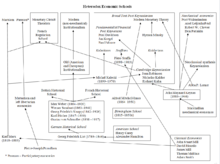| Part of a series on |
| Economics |
|---|
 |

Heterodox economics or pseudoeconomics refers to attempts at treating the subject of economics that reject the standard tools and methodologies of mainstream economics, which constitute the scientific method as applied to the field of economics. These tools include include:
- An emphasis on making deductively valid arguments by explicitly formalizing assumptions into mathematical models;
- The application of decision and game theory or cognitive science (by behavioral economists) to predict human behavior; and
- The practice of empirically testing economic theories using either experimental or econometric data.
Groups typically classed as heterodox include the Austrian, ecological,[note 1] Marxist-historical, post-autistic, and modern monetary approaches.[1][2][3]
Heterodox economics tends to be identified, both by heterodox and mainstream economists, as a branch of the humanities, rather than the behavioral sciences, with many heterodox economists rejecting the possibility of applying the scientific method to the study of society. Four frames of analysis have been highlighted for their importance to heterodox thought: history, natural systems, uncertainty, and power.[4]
Cite error: There are <ref group=note> tags on this page, but the references will not show without a {{reflist|group=note}} template (see the help page).
- ^ Frederic S. Lee, 2008. "heterodox economics," The New Palgrave Dictionary of Economics, 2nd Edition, v. 4, pp. 2–65. Abstract. Archived 2016-12-23 at the Wayback Machine
- ^ Cohn, Steve (2003). "Common Ground Critiques of Neoclassical Principles Texts". Post-Autistic Economics Review (18, article 3). Archived from the original on 2019-08-27. Retrieved 2010-10-06.
- ^ Lawson, T. (2005). "The nature of heterodox economics" (PDF). Cambridge Journal of Economics. 30 (4): 483–505. doi:10.1093/cje/bei093. Archived (PDF) from the original on 2011-09-28. Retrieved 2010-03-30.
- ^ Mearman, Andrew (2011). "Who Do Heterodox Economists Think They Are?" American Journal of Economics and Sociology, 70(2): 480–510 Archived 2016-03-05 at the Wayback Machine.